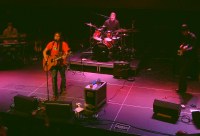|
Glen Phillips |
|
|
I'll be the first to admit that Toad the Wet Sprocket was my favorite band for many years. Next to REM, no other music spoke to me the way Toad did. Primarily, it was the lyrics and vocals of Glen Phillips that drew me in. When the group disbanded in 1998, I was shocked. Like many fans, I was excited about their newest release, Coil, and was not expecting them to call it quits. Luckily for Toad fans, when the band ended Phillips decided to take a shot at a solo career. After the death of his father and a battle with depression, Phillips independently released his first solo CD, Abulum, in 2001 and followed with a live CD in 2003. In March 2005, he hit the road in support of Winter Pays for Summer, his major label debut as a solo artist. Phillips recently talked with Way Cool Music about Toad, fans, and talent shows. |
|
|
Way Cool: |
You started playing music at a very young age and joined a band when you were only 14 years old. Do you feel there are any life experiences you missed out on as a result of that? |
| |
|
Glen Phillips: |
Probably. Itís hard to say. There are plenty that I had that I wouldnít have otherwise had. I would have liked to keep going to college and get a degree. I liked being in school. Iím good with assignments. Iím not that great when Iím left in a vacuum and I donít have to answer to anybody. So, I kinda like school. But aside from that, I didnít have to spend a lot of time wandering around wondering what to do with my life. I met my wife when I was 18 and life sort of fell into place aside from all the usually messy details. I donít feel like I missed stuff.
|
|
 |
|
WC: |
How long did you go to college? |
|
|
| GP: |
I did two years right before (Toad the Wet Sprocket) went on tour. I was kinda bored in high school, so I got out early. I graduated, though, and did two years before we left. I like reading. My family read; my dad read. He was a voracious reader. I would spend two weeks reading a book and then give it to him. The next morning he would say, ďIt was pretty good.Ē I just like books. |
|
|
WC: |
Did you choose music or did music choose you?
|
|
|
| GP: |
Music probably chose me. I liked sociology and anthropology and theater and thought Iíd probably be a high school teacher because I had a couple of great teachers and many average teachers. The great teachers were inspiring, especially my theater teacher. He realized he wasn't competitive enough to try to make it as an actor out in the world and I identified with that. I didn't want to have to sell myself and do that. So, I thought teaching would be a good way to do something that was individualized and would make a tangible difference and I liked that. But then the band came along and took me by surprise. |
|
|
WC: |
What are some of the best and most frustrating aspects of having music as a career?
|
|
|
GP: |
Itís like any other job. You do what you love part of the time and then, even if your job is doing what you love, you have your crappy day job. I have to be a sales rep for the Glen Phillips brand and thatís a little annoying, but I can deal with that.
Iíve been out of the media for eight years and now I have my anonymity back. Thatís been nice, but I remember the icky feeling that I was being watched all the time back when the band was doing well. So, it will be strange to go back to that. I couldnít go buy clothes because I would feel like all these eyes were on me. I could feel that I was being looked at and I would turn around and everybody would try to be discrete. My wife, Laurel, thought I was being crazy. I told her to go to the store with me and check it out. We went shopping and when we walked out, she looked like she had walked through spider webs. She was so freaked out by it. So, Iím not really looking forward to that coming back. But, thatís a good problem to have. It means that people know who I am and are getting the music, so thatís the price to pay for the job.
The best part is playing music and I get to work with people I like and who like me. I feel like Iíve been really privileged to be in the company Iíve been in for the past couple of years. That part of it is wonderful. |
|
|
WC: |
Tell us a little bit about the new band. |
| |
|
GP: |

|
|
First, there is my friend, Jonathan Kingham; I met him at the Durango Songwriters' Convention. We met through Kim Richey and we just hit it off and kept in touch. Iíd see him when I went up north and when he came down through Santa Barbara. I was frustrated about getting a band together and was talking to him on the phone and said, ďHey, youíre a pretty good keyboard player, arenít you? Want to be in the band?Ē He then found Sean (Bendickson) and Myles (Corbin), the rhythm section. They were his favorite rhythm section in Seattle. So, there it is! Itís fun. None of them have been on a tour like this before, so itís their first bus experience. And Iíve barely been on a tour like this forÖ Itís kinda like if you donít get your degree for seven years, you have to start over. Itís been eight years for me since itís been the norm. There have been a couple of exceptions, but, by and large, Iíve been out of the bus. Itís exciting. It feels new. |
|
| |
|
WC: |
Is there a history behind the bus?
|
|
|
GP: |
Not that I know of. I know that Los Lobos had it right before we did, so weíve been eating Los Lobosí left over salsa. Itís very good. |
|
|
WC: |
With so many new songs, how do you feel about getting requests for the older stuff?
|
|
|
GP: |
If they request ones I like, itís fine; or ones that I can play. Thatís the main thing. There are some songs that Iím just not fond of, so Iím happy not to play songs I donít like any more. That happened with Toad, too. It was odd going back to do the Toad tour. Those songs were so old to me by the time we were getting back and it was really weird to be this old music jukebox. With this tour, I can play the Toad songs I like and I donít have to play the ones I donít like. And I donít have to play the Glen songs I donít like, either. Itís my show. Itís kinda nice that way and Iím enjoying that. At this point, weíre just locked in to the songs we know how to play. |
|
|
WC: |
How many songs did you initially rehearse?
|
|
|
GP: |
Around 23 or so. Iím doing a few acoustic songs in the middle of the set to get us to the show length safely. |
|
|
WC: |
People have followed you for many years at many stages of your career. Tell us your thoughts on that. |
|
|
GP: |
Iím grateful for it. I think it was easier for me to take the audience for granted in Toad. Because there was so much internal turmoil and negativity, it was easy to discount any positive reinforcement from outside. I sent out an email recently thanking the fans. They feed my kids and Iím very grateful for that. I have a lot of friends who are brilliant musicians who didnít tour as much as Toad did, or if they did, they didnít build an audience like we did. The fact that I can keep going, and there are people who want to hear the new stuff, and love the new songs and are discussing them and care about it, it means a lot. At times when I couldnít get a record deal or couldnít do anything, when I was feeling completely outside and disenfranchised, the fact that people would still show up and know the new stuff and love the new stuff made me realize that I wasnít pathetic and deluded. So, that was good. |
|
|
WC: |
Now that you find yourself on a major labelÖ |
|
|
GP: |
Now I donít care about my audience. (Laughing) Fuck Ďem! |
|
|
WC: |
What does it mean to you professionally and personally to be on a label again after being independent for so many years? |
| |
|
GP: |

|
|
Itís wonderful. I didnít think it would ever happen again. I learned what I learned, so who knows whatís wasted time and whatís not. I know that Iíll never try to get a deal again. If I put this record out and (Lost Highway) get reabsorbed into some other wing of Universal and I get dropped and Iím out on the street again, Iím still better off then I was. I know Iíll make another record, not try to get a deal, put it out through an indie distributor or a large indie label, and just not waste my time trying to get through a door again. Iíll just make records, which is maybe what I should have been doing. |
As it is, thereís no place I can think that Iíd rather be than Lost Highway. They donít have anything bad. Even if you donít personally like all the stuff, itís all respectable. It may not be your favorite stuff, but itís all worthy of great respect. They have a culture thatís music based. They figure their job is to sell good music to people who will like it for what it is. I donít know of any other record company culture within the majors, except for maybe Nonesuch, who has that mandate. Or who feels that they are allowed to have it. There are plenty of individuals who feel that way, but no other culture that really everyone, from the top of the company down, is on the same page. To be part of that environment and to be part of that group of artists is vindicating. Iím really proud to be a part of it. Who knows what the future will bring. Itís the music business, so things can and will go in every direction, but right now Iím very thankful to be where I am. |
|
|
WC: |
A lot of people speculate about where youíre career is going. What are your career aspirations? |
|
|
GP: |
To be able to put money away for the kidsí college fund again and to put money away for retirement again. To put out a bunch of records. If I just put out records, keep working, and donít spend time not putting music out because Iím spending time trying to get through the door of a record company that doesnít get what I do and doesnít want to get what I do, or gets what I do but doesnít think they can sell it because Iím not whatever theyíre selling that minute... if I just keep working, Iíll be fine.
Worst case scenario is better off than I was. Best case, I wouldnít argue with selling millions of records. I think that would be absolutely wonderful. I would really like to sell millions and millions of records. That would be a fantastic thing to happen, but Iím not going to count on it. I consider myself lucky to be able to make a living doing this. And at 34, Iím sure I could learn to do many other things, but I donít have much else of a skill set. |
|
|
WC: |
What was the last great book you read?
|
| |
|
GP:
|
Great? I just finished 'Peace Like a Riverí by Leif Enger. Thatís a beautiful book. And Iím reading ĎWerewolves in Their Youth: Storiesí by Michael Chabon. I got part of the way through ĎThe Selfish Gene,í but then I went back to fiction. Itís not dry; I wanted to get further into it, but I got sidelined by fiction again. |
|

|
|
| |
|
WC: |
We have a theory that there is an alternate universe and each person has an Ďalternateí version of them. What do you think ĎAlternate Glení is doing right now? |
|
|
GP: |
Heís working at a public school. Heís very frustrated about job security and the destruction of public education thatís been going on and the standardized testing, bullshit curriculum that heís being forced to teach and wondering how the arts program can possibly be saved at the school where heís teaching. Probably everything else is about the same. I think weíd live in the same house. We live in the house Laurel grew up in, so weíd be there. Maybe Iíd be teaching across the street. Itís a good school. Alternate Glen is similar, but not doing this. Or perhaps I would have sold out and gone into advertising. The Shadow Glen would have gone into advertising, made a boatload of money, been divorced twice, have a kid he never sees, and a terrible cocaine habit. |
|
|
WC: |
We like this Glen better. |
|
|
GP: |
I like this Glen better, too. Teacher Glen is OK. And heíll be OK. Heíll end up taking a pay cut to teach at a private school where heís given more freedom with what he teaches, but it will be worth it. |
|
|
WC: |
Heíll probably win all the talent shows, too. |
|
|
GP: |
Weíll see. I find I have trouble with talent shows. Actually, high school I can handle, which is part of the reason I wanted to do high school instead of grade school. Thereís a certain level under which itís really painful to watch talent shows, even if itís cute. I get enough of it at home! |
|
|
WC: |
When youíre out shopping and you hear ĎAll I Wantí or ĎWalk on the Oceaní come over the PA as muzak, what is your response? |
|
|
GP: |
As muzak, I love it. The real version is nice to. Itís cool. Thatís a quarter of a cent by the time everyone is through with it. It adds up, slowly but surely. Itís like a very small trust fund.
|
|
|
WC: |
We like to end interviews with a game we call "7 Questions." |
|
|
|
|
|
|

|
|
|
What's the worst job you've ever had?
|
|
I was an espresso guy, and that wasnít that bad. And I worked for my momís business for a short while just cleaning her office and sorting. That might have been the worst. Iíve only had 3 jobs, so itís hard to say. Iíve done the occasional cleaning up of someoneís back yard, but who hasnít? |
|
What's your favorite movie quote or song lyric?
|
|
I can tell you my favorite lyric that I got wrong. Itís a Kim Richey song called ĎFadingí and thereís this line that I thought was, ďYou took me dancing/I donít like dancing/Best time Iíve ever had.Ē I thought that was a perfect line! I was playing it for a friend and saying, ďShe is a genius. This is the best lyric ever written!Ē And they said, ďShe says ĎYou took me dancing/Out all night dancing/Best time Iíve ever had.íĒ Thatís good, but ďI donít like dancingĒ made it so perfect! |
|
Who would you want to star in the movie of your life?
|
|
Will Smith. |
|
What's your favorite TV theme song?
|
|
The Tick. |
|
If you were a superhero, what would your name be?
|
|
The Ochre Crust. |
|
What do you want to be when you grow up?
|
|
At peace. |
|
Finally, why are there so many songs about rainbows?
|
|
Have you seen this Kimmel thing with a quote of Bush? (Imitating George Bush) ďThat was the rainbow speech. I was speaking in the square of Belgrade and there was rainbow that appeared over the crowd and I knew that was a sign of freedom. Freedom is a powerful thing.Ē
Why are there so many songs? The trite answer would be because of the number of hallucinogens musicians tend to take. Thatís the trite answer. Iíll just say there arenít. Kermit is wrong! |
|
|
|
|
|
To find out more information about Glen Phillips, visit his website at www.glenphillips.com. |
|
|